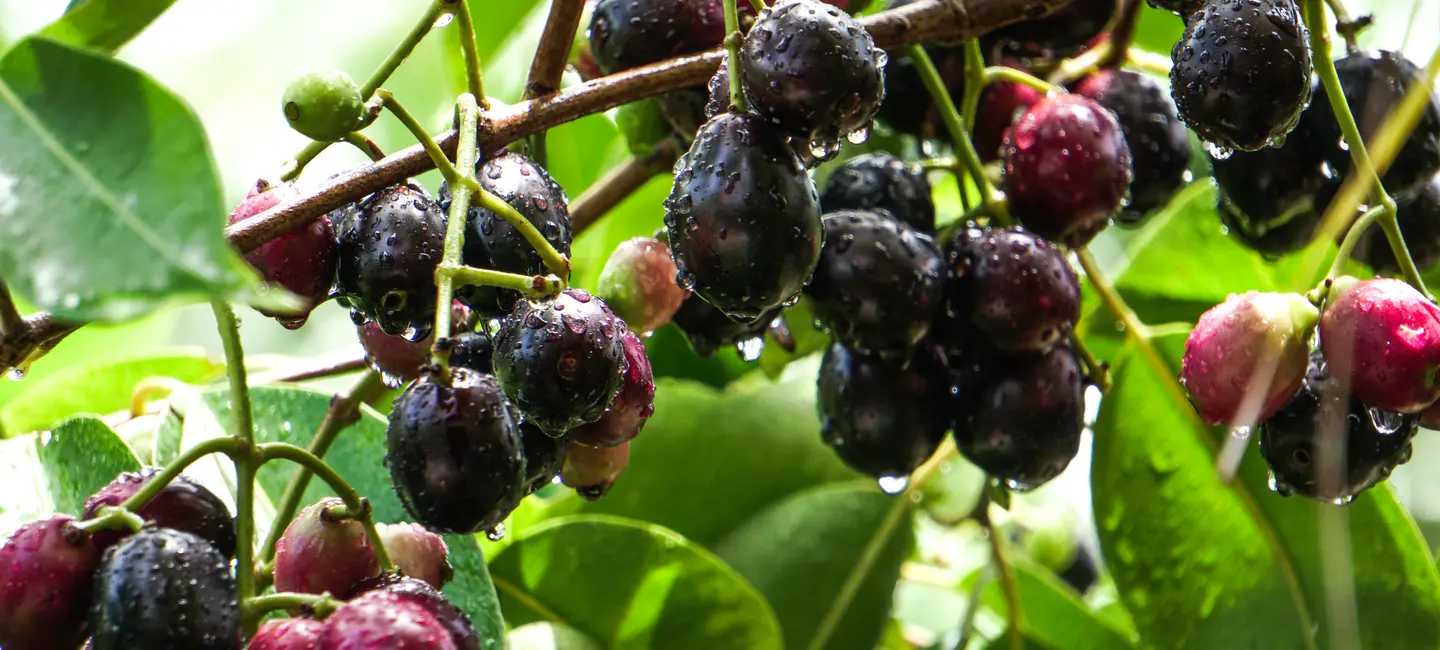
Jambolan is a tree. The seed, leaf, bark, and fruit are used to make medicine.
Jambolan is widely used in folk medicine for diabetes.
It is also used by mouth for gas (flatulence), swelling (inflammation) of the stomach (gastritis), constipation, diarrhea, and other conditions.
Jambolan is sometimes used for sore throat, and applied directly to the skin for skin ulcers.
Is It Effective?
NatMed Pro rates effectiveness based on scientific evidence according to the following scale: Effective, Likely Effective, Possibly Effective, Possibly Ineffective, Likely Ineffective, Ineffective, and Insufficient Evidence to Rate.
- Diabetes. Limited research in people with type 2 diabetes suggests that drinking jambolana tea prepared from 2 grams of jambolana leaves per liter of water does not improve fasting blood sugar levels.
- Asthma.
- Constipation.
- Diarrhea.
- Gas (flatulence).
- Skin ulcers, when applied to the skin.
- Sore mouth and throat, when used as a gargle.
- Swelling (inflammation) of the main airways in the lung (bronchitis).
- Swelling (inflammation) of the pancreas (pancreatitis).
- Swelling (inflammation) of the stomach (gastritis).
- Other conditions.
More evidence is needed to rate the effectiveness of jambolan for these uses.
Is it Safe?
Jambolan seed and bark contains chemicals that might lower blood sugar, but extracts from jambolan leaf and fruit don't seem to affect blood sugar. Jambolan also contains chemicals that might protect against oxidation damage, as well as chemicals that reduce swelling.
When taken by mouth: Jambolan is POSSIBLY SAFE for most people when taken by mouth, short-term. Jambolan tea prepared from 2 grams of jambolan leaves per liter of water seems to be safe.
Special Precautions & Warnings:
Pregnancy and breast-feeding: There isn't enough reliable information to know if jambolan is safe to use when pregnant or breast-feeding. Stay on the safe side and avoid use.
Diabetes: Jambolan seed and bark extracts might lower blood sugar levels. Monitor blood sugar levels closely if you have diabetes and take jambolan.
Surgery: Jambolan might lower blood sugar levels. There is some concern that it might interfere with blood sugar control during and after surgery. Stop using jambolan at least 2 weeks before a scheduled surgery.
Medications changed by the liver (Cytochrome P450 2C9 (CYP2C9) substrates)
Interaction Rating=Moderate Be cautious with this combination.
Some medications are changed and broken down by the liver. Jambolan might decrease how quickly the liver breaks down some medications. Taking jambolan along with some medications that are broken down by the liver might increase the effects and side effects of some medications. Before taking jambolan, talk to your healthcare provider if you take any medications that are changed by the liver.
Some medications that are changed by the liver include amitriptyline (Elavil), diazepam (Valium), zileuton (Zyflo), celecoxib (Celebrex), diclofenac (Voltaren), fluvastatin (Lescol), glipizide (Glucotrol), ibuprofen (Advil, Motrin), irbesartan (Avapro), losartan (Cozaar), phenytoin (Dilantin), piroxicam (Feldene), tamoxifen (Nolvadex), tolbutamide (Tolinase), torsemide (Demadex), warfarin (Coumadin), and others.
Medications for diabetes (Antidiabetes drugs)
Interaction Rating=Moderate Be cautious with this combination.
Jambolan seed and bark extracts might decrease blood sugar levels. Diabetes medications are also used to lower blood sugar. Taking jambolan seed or bark along with diabetes medications might cause your blood sugar to be too low. Monitor your blood sugar closely. The dose of your diabetes medication might need to be changed.
Some medications used for diabetes include glimepiride (Amaryl), glyburide (DiaBeta, Glynase PresTab, Micronase), insulin, pioglitazone (Actos), rosiglitazone (Avandia), chlorpropamide (Diabinese), glipizide (Glucotrol), tolbutamide (Orinase), and others.
Sitagliptin (Januvia)
Interaction Rating=Minor Be watchful with this combination.
Jambolan seed extract might lower blood levels of the medication sitagliptin. Sitagliptin helps the body lower blood sugar to normal levels in patients with diabetes. Taking jambolan seed along with sitagliptin might cause changes in your blood sugar. Monitor your blood sugar closely. The dose of sitagliptin might need to be changed.
Herbs and supplements that might lower blood sugar levels: Jambolan seed and bark extracts might lower blood sugar levels. There is a concern that using it with other natural products that have this same effect might cause blood sugar levels to drop too low. Avoid this combination. Some herbs and supplements that might lower blood sugar levels include alpha-lipoic acid, bitter melon, carqueja, chromium, devil's claw, fenugreek, garlic, guar gum, horse chestnut, Panax ginseng, psyllium, Siberian ginseng, and others.
There are no known interactions with foods.
The appropriate dose of jambolan depends on several factors such as the user's age, health, and several other conditions. At this time there is not enough scientific information to determine an appropriate range of doses for jambolan. Keep in mind that natural products are not always necessarily safe and dosages can be important. Be sure to follow relevant directions on product labels and consult your pharmacist or physician or other healthcare professional before using.
Badijamun, Black Plum, Duhat, Eugenia cumini, Eugenia jambolana, Indian Blackberry, Jaman, Jambol Tree, Jambolan, Jambolan Plum, Jambolao, Jambose, Jambosier, Jambu, Jambul, Jamelongue, Jamelonguier, Jamum, Java Plum, Jumbul, Kavika Ni India, Mahajambu, Mesegerak, Phadena, Plum, Prune de Java, Rajajambu, Rose Apple, Syxygii Cumini Cortex, Syzygium cumini, Syzygium jambolanum, Syzygium jambos.
Information on this website is for informational use only and is not intended to replace professional medical advice, diagnosis, or treatment. While evidence-based, it is not guaranteed to be error-free and is not intended to meet any particular user’s needs or requirements or to cover all possible uses, safety concerns, interactions, outcomes, or adverse effects. Always check with your doctor or other medical professional before making healthcare decisions (including taking any medication) and do not delay or disregard seeking medical advice or treatment based on any information displayed on this website.
© TRC Healthcare 2024. All rights reserved. Use and/or distribution is permitted only pursuant to a valid license or other permission from TRC Healthcare.
